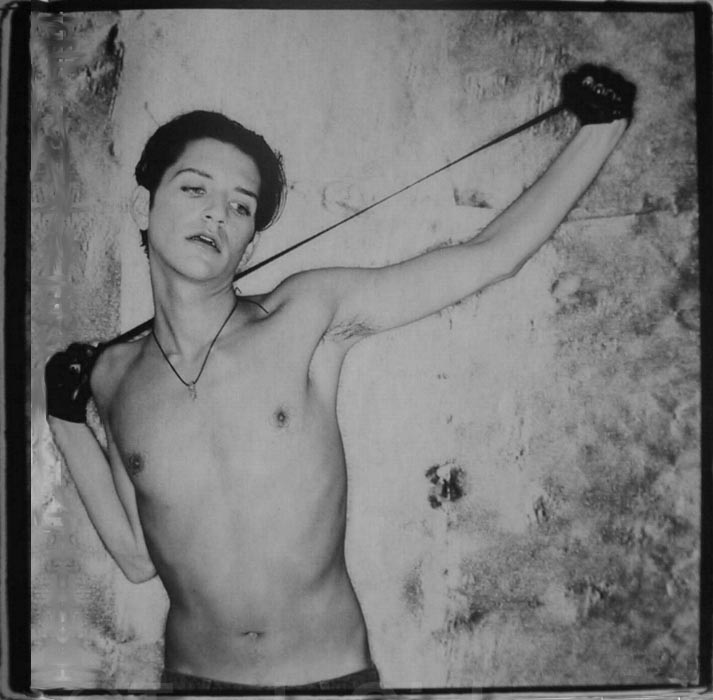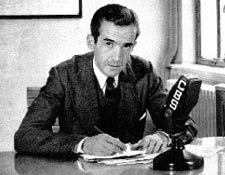THE EXITTwo men in an ambiguously located restroom.M: So this is what it all comes down to, huh? You and I, this shitty bathroom.
R: Just us.
M: I said goodbye to them in the car, but I don’t think they got it.
R: Do they ever?
M: I don’t know. I’ve never done this before.
R: Oh. Right.
Pause.R: I have.
M: Yes.
Pause.M: I’ve known all day, I think.
R: I think you’ve known a lot longer than that.
M: I know I’ve been thinking about it a lot longer, at least.
R: What’s really going to drive you up the wall is have you just been thinking about it or have you actually known it?
M: What?
R: You’d be surprised, some of the answers I get.
Pause.M: Whatever. It’s nearly done now.
R: Yes.
Pause. R smiles.R: Tell me what you did today.
M: I got up, I went to work. I saw her when I went off-shift.
Slight pause.M: I took myself out to lunch. Everything tasted different. I went to the diner and got a cup of coffee and a club sandwich. It tasted so real.
R: What do you mean?
M: Or maybe it tasted unreal. I don’t know. I could feel every bite in my mouth.
R: Don’t you always?
M: Yes, but I
noticed this. I could feel the chunks of bread, the ham, the lettuce, shredded. I felt it with my tongue; I felt it inside my esophagus all the way down to my stomach. It wasn’t just the food, either. I remember seeing an old man walking past the window, and I noticed the creases around his eyes, the tired wrinkles in his forehead. Everything seemed strangely significant, but it wasn’t.
Pause.M: I never really pay that much attention to what I’m eating, you know?
R: You do eat fast.
M: I mean, I like eating when I’m hungry, but it’s always been more about relieving hunger than really enjoying or paying attention to the meal.
R: Did you enjoy it today?
M: Not really. I just couldn’t stop noticing, I couldn’t stop thinking about it. Maybe it wasn’t surreal. Maybe it was hyper-real. I don’t know. It was bizarre.
R: So it meant something?
M: What?
R: If you noticed this so profoundly, it must have meant something to you.
M: What?
R: Just the fact that it seems like it’s affected you.
M: But what did it mean? What does it mean?
R: I can’t tell you that.
M: If not you, then who? I know I can’t, even if it did mean something.
R: Why not?
M: I can’t because even if it did mean something to me, I don’t really feel like whether it did or didn’t has any real significance to anything.
R: Not to you?
M: No.
R: Well, there you have it.
M: Yeah. Wait, what?
R: It doesn’t seem like it meant anything.
M: Doesn’t it? Then why’d I notice?
R: I don’t know. Maybe you were bored. Did you notice anything else today?
Pause. M thinks.M: My mom.
R: What about her?
M: I feel kind of sorry for my mom.
R: Why?
M: I don’t think she’s very happy. I don’t anyone would be, stuck in that huge house all by herself. Whenever I go see her, she always latches onto me, I think because no one visits her. If I go, it’s the highlight of the week. Everything else is just groceries and cats and potted palms.
Pause.M: I don’t think she’d like this very much.
He laughs. M: She wouldn’t
approve.
R: Nobody wants to think of their son like this. Here. With me. Would you?
M: Of course not.
Pause.M: I’m still going to feel guilty.
R: No, you’re not.
M: I don’t want to leave her by herself.
R: There’s your dad.
M: You know what I mean.
R: Maybe she’ll be happier with a bit of peace and quiet.
Pause.R: It isn’t really like you got along that well anyway.
Pause.R: ‘Hell is other people.’
M: No, it isn’t. That’s ridiculous.
R: Why?
M: Hell is being alone in the dark and knowing that there isn’t anyone there. Hell is screaming into the abyss and not even hearing an echo.
Pause.M: The world around you, everything you see, is an illusion. But not the sort of illusion that once removed reveals any sort of cosmic truth. There’s nothing higher, nothing cosmic. We’re totally irrelevant to the cosmos. If there’s any truth, if there’s any bigger truth than you or me, then this is it: The world is a gauzy lie superimposed over shadows. What you see is a painted scrap of paper covering a deep well. The foundation of the world rests not in shifting sand but in emptiness so profound, so still in its clarity, as to make its absence instead seem a nearly tangible presence.
Pause.M: It’s something you know because it lives inside you. This knowledge lives inside of everyone. Most people try to forget it. They try to shut it up inside, boarding it over with planks, weighting the planks with stones. They ignore it because if you acknowledge that crawlspace in the basement, if you give it any recognition or consideration, it slowly starts sucking everything in. Your emotions, your opinions, your personality. Everything you are gets consumed, until eventually you’re just a mere façade of humanity wrapped around a dying star, a black hole. It displaces your soul; it cuts out your core, and replaces it with itself. And you can feel it inside your head, looking out through your eyes. It’s underneath your skin, feeling what you feel. And one day, you realize that it isn’t even your hands, it isn’t your will, but this, this thing’s. This thing which you’ve created or maybe it’s created you. You don’t even know what you are anymore. You try to ignore it, you tell yourself lies, but no matter what you do or say, it starts creeping out, leaking out of your pupils, dripping out of the pores in your skin, sucking light and joy and satisfaction out of everything you see.
Pause.M: You can feel all this happening, you can feel it, but you can’t stop it, you can’t control it. You see it everywhere. You want to cut out someone else’s eyes and paste them over your own so that you don’t have to see this happening. It paints the world with its dark brush, thicker and thicker, until you don’t see how you could have ever found anything beautiful at all. It eats everything: things you loved, people you cared about, worlds you didn’t even know existed. After exposing everything, you eat away at yourself like a starving man devouring his own flesh: all alone, in the cave, no light, no companions, unbound and unrestricted with no place to go and nothing to do but scream or pray.
Pause. R: That bad, eh?
M: No. It isn’t anything. It doesn’t even mean anything.
R: It must.
M: No.
R: Then why even tell me all this? Why tell me about lunch, or about this? We could just get it over with, you know.
M: I want someone to hear me. I don’t know.
R: So you came to me.
M: Yes.
R: That doesn’t seem wise.
M: Depends on your point of view. Try to imagine where I’m coming from.
Pause. M looks at his watch.M: Last stop.
He beckons R to him.R: Wait.
M: Yes?
R: Tell me what it feels like.
M: What it feels like?
R: Yes.
M: It feels like everything and nothing. It feels like everything you’ve ever felt wrapped around a hollow core. You’re angry, you feel it eating you up, but you know that all your rage is impotent, would be impotent even if the whole world was consumed by it. You feel overwhelmed with awe or love or common, everyday feelings; all of it could bring you to your knees if it mattered. Every time you feel something, you’re just throwing yourself against a door that’s been locked, welded shut, forgotten about.
R: I wish I could feel something. Anything. Just once.
M: No, you don’t. Be grateful. You open up that door and you’ll end up like me.
R: Is that really so bad?
M: I don’t know.
R: What’s the alternative?
M: Forgetting it, I suppose.
R: You could do that, you know. You could walk away right now and forget all this. Everything.
M: No, I couldn’t.
R: What if you could? Would you?
M: I don’t know. No.
R: Why not?
M: Because once you’ve seen the truth, you can’t just forget it. You don’t want to. Forsaking the truth is totally inhuman. People are truth seekers. We’re truth-addicted. It’s the whole issue, the point. ‘What is the answer?’ ‘What is truth?’ Even Jesus couldn’t answer that one. Just being happy doesn’t suffice. Happiness isn’t a sufficient substitute. We’re not animals. We’re all too willing to throw away happiness in search of something greater, more beautiful, more real, something somehow truer than existence itself. This isn’t enough; this world does not suffice us. We desire truth more than we value life because we know that life is truthless, but we’re terrified of facing that, so we try to hide ourselves away in fictions. We try to make ourselves forget, but everyone knows it. Everyone knows that it’s hiding somewhere deep in that basement, even if we’ve managed to board it up and convince ourselves that we’ve forgotten. But I remember:
The lights flicker.M: Significance only exists in abnegation.
The lights continue flickering.M: The only truth is its absence.
The lights start to die.M: Hell is existence.
R: Kiss me one last time.
They kiss.
Blackout.
Seconds after the blackout, the sound of a pistol shot is distinctly heard.
Curtain.
















